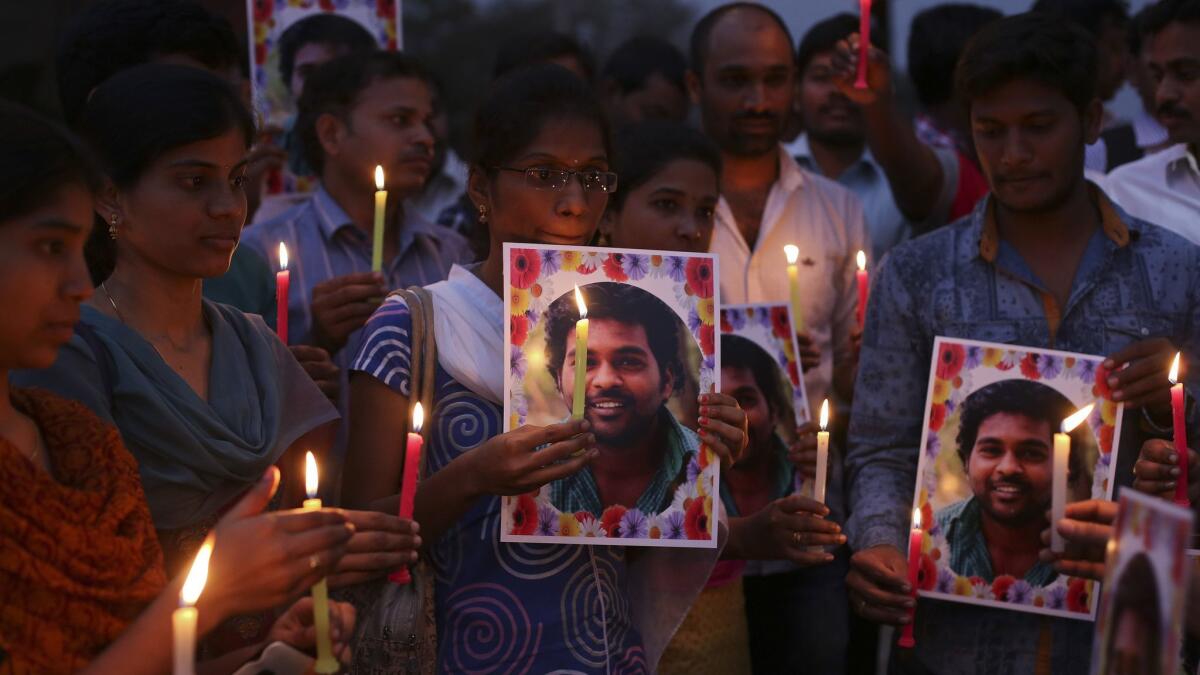Another Dalit suicide on campus raises fears of a crisis of discrimination at Indian universities

- Share via
Reporting from Mumbai, India — When a student’s body was found hanging in his friend’s room this week at New Delhi’s Jawaharlal Nehru University, the story sounded all too familiar.
Muthu Krishnan, 28, was a first-year student in the philosophy program pursuing a master’s degree at the prestigious public university in India’s capital. He was a Dalit, occupying the lowliest level of India’s ancient caste system, and the first person in his family to have access to education.
Fourteen months ago, another Dalit university student, Rohith Vemula, committed suicide at the University of Hyderabad in southern India. The 26-year-old Ph.D. candidate had been suspended from classes after clashing with a right-wing student group with ties to India’s governing Bharatiya Janata Party.
Krishnan’s death has already reignited a debate over whether Indian universities provide a healthy atmosphere for lower caste students.
While police said they are still searching for a motive in Krishnan’s apparent suicide, students said he had been deeply troubled by the status of Dalits, once known as “untouchables,” at the university. He was a student at the University of Hyderabad when Vemula committed suicide and had been active in a movement called “Justice for Rohith.”
“Muthu has been vocal about the systematic alienation of students from marginalized sections [of society] from higher education,” the university’s student union said in a statement.
The student group also accused the administration of a lack of sensitivity, saying no top university official had met with members of Krishnan’s family since his body was found Monday evening.The university has not commented publicly.
Chinmoy Biswal, a Delhi police official, said Krishnan had come to a friend’s residence in the afternoon for lunch and then went into another room to sleep, locking the door. His body was found after friends called police, who broke down the door.
Ten days before he died, Krishnan had complained about inequality at the university in a Facebook post. He wrote that students from marginalized groups, including Dalits and lower castes, faced discrimination in admissions to master’s and doctorate programs and in the oral exams, known as “viva voce,” that determine final grades.
He had also written about his struggles with English, the language of higher education in India, and how he had to apply several times before receiving admission to the university. Those complaints are widely echoed by lower-caste students in India, who, despite government quotas that ensure them places at universities, say professors and higher-caste students discriminate against them because of their perceived “backwardness.”
“When equality is denied everything is denied,” he wrote in the Facebook post.
Krishnan – nicknamed “Rajni Krish” because of his resemblance to a famous film star from his home state of Tamil Nadu, Rajnikant – had also written an article about Vemula’s suicide, which sparked a controversy over nationalism in India under Prime Minister Narendra Modi. Supporters of Modi’s BJP have led drives to ban the consumption of beef in a handful of Indian states on the grounds that the cow is sacred in Hinduism, even though beef is a staple of the diet of many Dalits and lower caste Hindus.
Vemula and other Dalit students had staged events on campus opposing the death penalty for a convicted terrorist. Senior members of Modi’s party objected to their actions, with one writing to the federal education ministry that the campus had turned into “a den of casteist, extremist and anti-national politics.”
Liberal activists also criticized Modi’s government for not addressing Vemula’s complaints about discrimination and instead raising questions about whether he was indeed a Dalit.
Krishnan wrote in a blog post addressed to Vemula’s mother: “They are going to kill many Rohiths, like us, just for eating beef, for being rational, for being intellectually productive for the country. But we are the real sons of this land and after we are all killed, there will be no nation.’’
Umar Khalid, a Ph.D. student and activist at Jawaharlal Nehru University, or JNU, wrote in a Facebook post, “Our universities are being turned into graveyards for the oppressed.”
Milind Awad, an assistant professor at the university, said it was time that officials confronted the issue of the isolation faced by students from marginalized sections of society.
“University campuses are supposed to be egalitarian,” Awad said in an interview. “JNU is egalitarian to a great extent, yet Krishnan committed suicide. It begs the question of how equipped Indian universities are to deal with nervous breakdowns of students.”
Parth M.N. is a special correspondent. Times staff writer Shashank Bengali in Bangkok, Thailand, contributed to this report.
More to Read
Sign up for Essential California
The most important California stories and recommendations in your inbox every morning.
You may occasionally receive promotional content from the Los Angeles Times.













